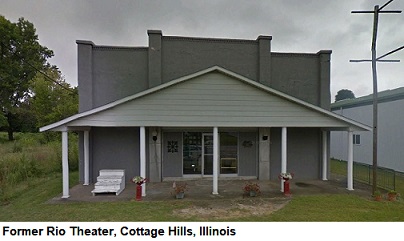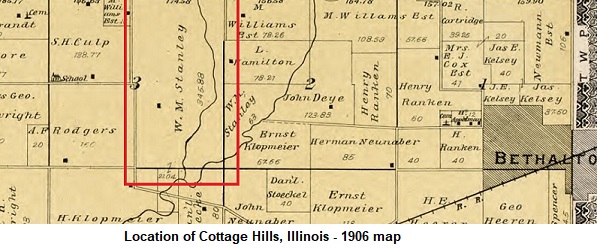Early History of Cottage Hills
Cottage Hills was originally called Possum Ridge. It is an
unincorporated area between Upper Alton and Bethalto in Wood River
Township, at Highway 140 and Stanley Road. In 1934, the Home Sales
Company purchased land from the Stoker family and began platting for
a subdivision. The north side was called Cottage Hills, and the
south side was named Marshalltown, after Charley Marshall, an Upper
Alton builder, who bought the first 10-acre tract. Later the two
merged.
By 1936, The Cottage Hills Club was opened on Rt. 140, which was a
popular tavern which advertised not only food and drinks, but had a
large dance floor and live bands. The club closed in the early
1940s, and the New Covenant Ministry opened in this building.
During the 1940s and 1950s, the Rio Theater operated in Cottage
Hills. It was located on MacArthur Drive (Highway 140).
Below is a 1906 map, showing (box in red) the location of Cottage
Hills, Illinois. At one time, Wasson Stanley had a large farm on
this land. Stanley Road is named after this family.
NEWSPAPER ARTICLES:
SKELETON FOUND ON STANLEY FARM BY ALTON HUNTER
(Forest Homes/Cottage Hills Area)
Source: Alton Evening Telegraph, November 15, 1920
Frank Hamilton, while out hunting yesterday, discovered almost
buried in the sands of the Wood River Creek bottom, about 1 1/2
miles southeast of the state hospital, the skeleton of a woman which
he reported and the skeleton was taken in charge by Deputy Coroner
W. H. Bauer. The skeleton was devoid of flesh, but clinging to it
was still the remnant of some clothing, including a dark colored
coat, and the shoes were those of a woman. The body had evidently
been buried in the Wasson Stanley farm long ago, and had been
partially uncovered of late. Mr. Hamilton saw the skull protruding
from the sands and made an investigation. As no one living in the
vicinity was reported to have been missing, it was supposed that the
body was that of one of the wandering patients of the Alton State
Hospital. The theory advanced, is that one of the hospital patients,
wandering at large, either deliberately or accidentally got into the
waters of Wood River when the stream was at flood, and was deposited
where found and covered by the sands, remaining there until the
flesh had decayed from the bones. Dr. George A. Zeller was consulted
and he said that over a year ago there was one woman from Jersey
county who had disappeared from the institution and whose relatives
made search for her and she was never found. It is not positive that
the skeleton is her remains, nor is there much possibility of
effecting an identification because of the bad condition of the
garments, which have rotted and discolored until there is little
chance of knowing what the original ______ was. The bones and
fragments _____ clothes were gathered by Deputy Coroner Bauer, who
will hold them until hope of identification is given up completely.
Dr. Zeller declared that there was enough of the garment to make it
possible for a negative identification, that is that it was not the
remains of any former inmate of the State hospital at Alton. The
reason why the body was not discovered earlier is that the land
where it was found was not cultivated last year. The assumption by
some is that the body was interred by someone where it was found,
not deep in the ground, and the mystery started by the discovery of
the skeleton was deeper as the inquiry proceeded.

